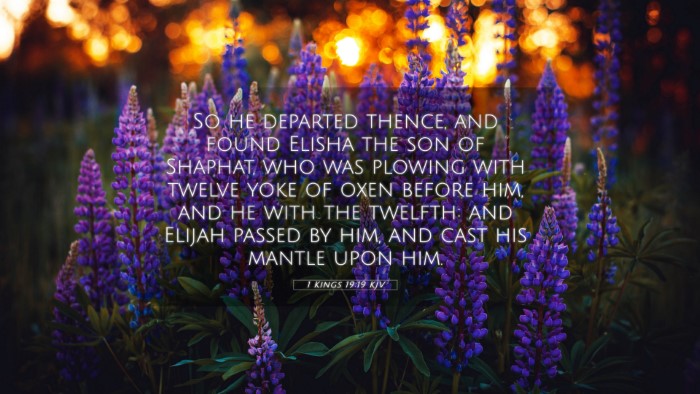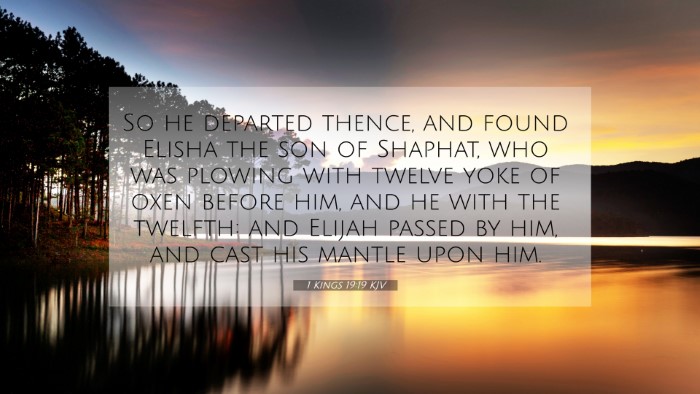Old Testament
Genesis Exodus Leviticus Numbers Deuteronomy Joshua Judges Ruth 1 Samuel 2 Samuel 1 Kings 2 Kings 1 Chronicles 2 Chronicles Ezra Nehemiah Esther Job Psalms Proverbs Ecclesiastes Song of Solomon Isaiah Jeremiah Lamentations Ezekiel Daniel Hosea Joel Amos Obadiah Jonah Micah Nahum Habakkuk Zephaniah Haggai Zechariah Malachi1 Kings 19:19 Similar Verses
1 Kings 19:19 Cross References
So he departed thence, and found Elisha the son of Shaphat, who was plowing with twelve yoke of oxen before him, and he with the twelfth: and Elijah passed by him, and cast his mantle upon him.
Uncover the Rich Themes and Topics of This Bible Verse
Listed below are the Bible themes associated with 1 Kings 19:19. We invite you to explore each theme to gain deeper insights into the Scriptures.
1 Kings 19:19 Cross Reference Verses
This section features a detailed cross-reference designed to enrich your understanding of the Scriptures. Below, you will find carefully selected verses that echo the themes and teachings related to 1 Kings 19:19 KJV. Click on any image to explore detailed analyses of related Bible verses and uncover deeper theological insights.
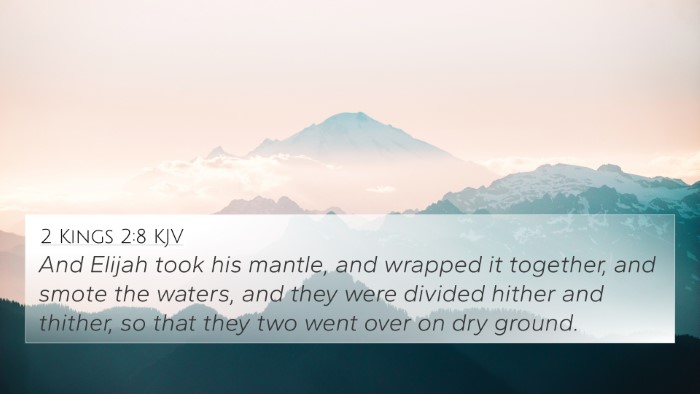
2 Kings 2:8 (KJV) »
And Elijah took his mantle, and wrapped it together, and smote the waters, and they were divided hither and thither, so that they two went over on dry ground.

2 Kings 2:13 (KJV) »
He took up also the mantle of Elijah that fell from him, and went back, and stood by the bank of Jordan;
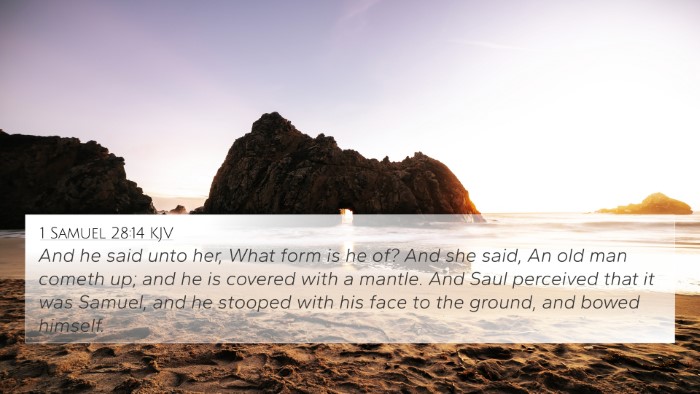
1 Samuel 28:14 (KJV) »
And he said unto her, What form is he of? And she said, An old man cometh up; and he is covered with a mantle. And Saul perceived that it was Samuel, and he stooped with his face to the ground, and bowed himself.
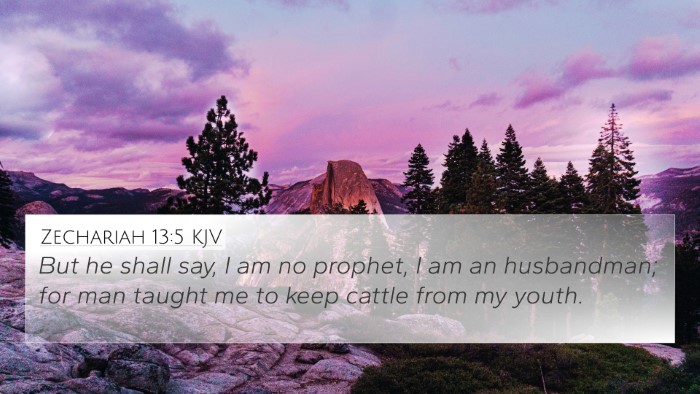
Zechariah 13:5 (KJV) »
But he shall say, I am no prophet, I am an husbandman; for man taught me to keep cattle from my youth.
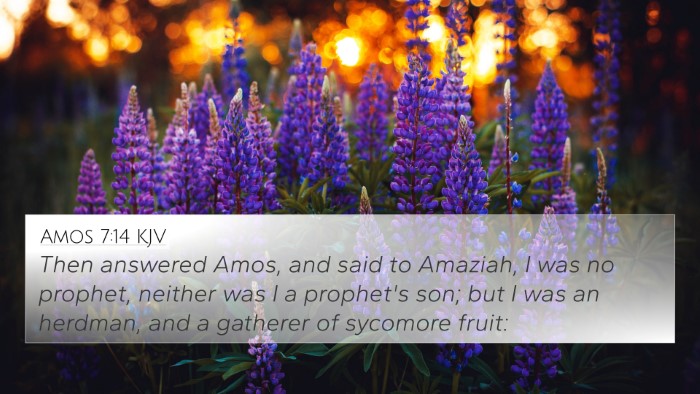
Amos 7:14 (KJV) »
Then answered Amos, and said to Amaziah, I was no prophet, neither was I a prophet's son; but I was an herdman, and a gatherer of sycomore fruit:
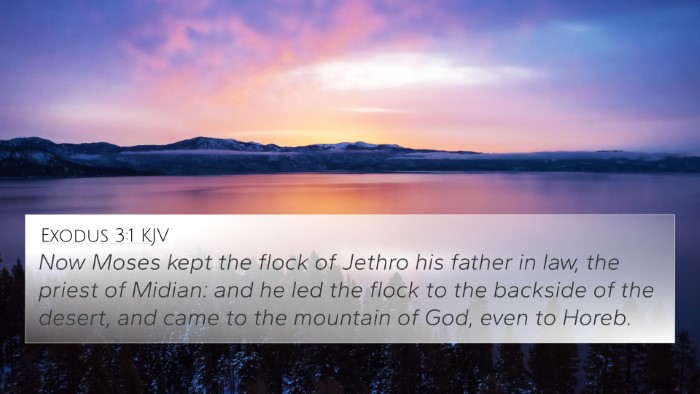
Exodus 3:1 (KJV) »
Now Moses kept the flock of Jethro his father in law, the priest of Midian: and he led the flock to the backside of the desert, and came to the mountain of God, even to Horeb.
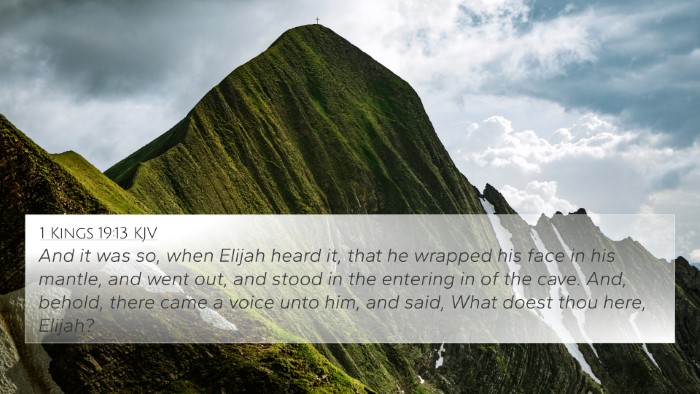
1 Kings 19:13 (KJV) »
And it was so, when Elijah heard it, that he wrapped his face in his mantle, and went out, and stood in the entering in of the cave. And, behold, there came a voice unto him, and said, What doest thou here, Elijah?
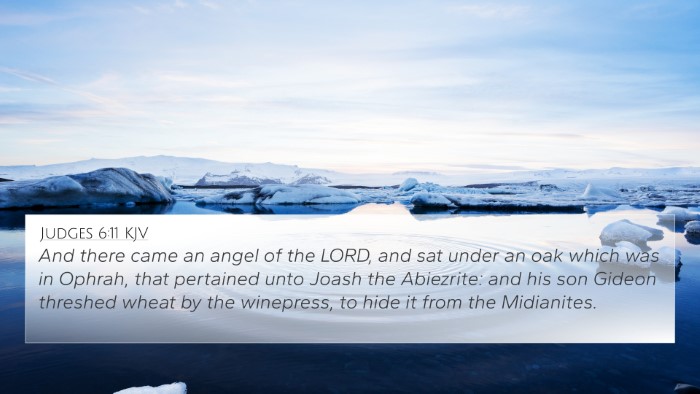
Judges 6:11 (KJV) »
And there came an angel of the LORD, and sat under an oak which was in Ophrah, that pertained unto Joash the Abiezrite: and his son Gideon threshed wheat by the winepress, to hide it from the Midianites.
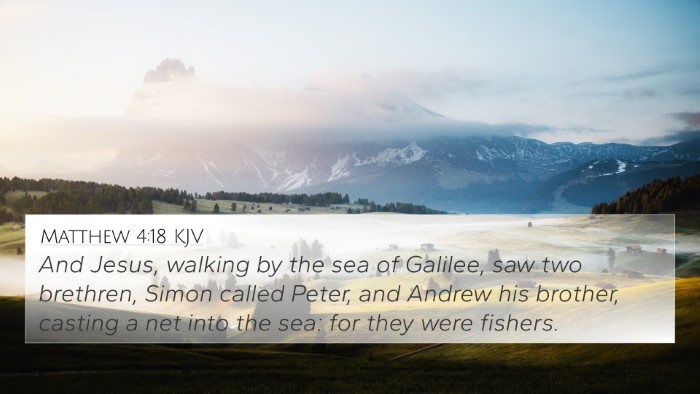
Matthew 4:18 (KJV) »
And Jesus, walking by the sea of Galilee, saw two brethren, Simon called Peter, and Andrew his brother, casting a net into the sea: for they were fishers.
1 Kings 19:19 Verse Analysis and Similar Verses
Understanding 1 Kings 19:19
1 Kings 19:19 states: “So he departed from there, and found Elisha the son of Shaphat, who was plowing with twelve yoke of oxen before him, and he was with the twelve. Then Elijah passed by him and threw his mantle on him.”
Verse Context and Background
This verse occurs in a critical transition within the life of the prophet Elijah, following his confrontation with the prophets of Baal and his subsequent flight from Queen Jezebel. Elijah's journey is marked by divine intervention and preparation for the next generation of prophetic ministry.
Commentary Insights
-
Matthew Henry's Commentary:
Henry highlights that Elijah's calling of Elisha symbolizes the passing of prophetic responsibility. He notes the significance of Elisha being busy with work and how God often calls those who are diligent and productive when He chooses them for His service.
-
Albert Barnes' Notes:
Barnes points out the importance of the mantle, which signifies the prophetic office and authority. The act of throwing the mantle was both a symbolic and tangible calling, demonstrating God's selection of Elisha as Elijah's successor.
-
Adam Clarke's Commentary:
Clarke provides insights into the symbolism of the twelve yoke of oxen, suggesting they represent the twelve tribes of Israel. He emphasizes that Elisha's response to his calling—after being engaged in agricultural work—shows a readiness to follow God’s plan amidst everyday life.
Thematic Connections
This verse is rich in themes of calling, succession, and divine selection. The act of passing the mantle involves several vital components:
- God's providence in calling: God chooses individuals based on His divine purposes.
- Work and readiness: Being engaged in one's work when called often indicates a life prepared for God's use.
- Transition of Leadership: The mentorship role of Elijah to Elisha reflects God's design in the continuity of spiritual leadership.
Cross-References to Explore
1 Kings 19:19 connects to several other scripture passages:
- Exodus 3:10: God's calling of Moses, highlighting a similar divine working through an ordinary person's life.
- 1 Samuel 16:12-13: The anointing of David, showcasing the passing of anointing and leadership.
- 2 Kings 2:1-15: The transition of prophetic authority from Elijah to Elisha fully realized.
- Luke 9:62: The concept of being fit for the Kingdom if one looks back after being called.
- Matthew 4:19: Jesus calling His disciples, emphasizing the theme of leaving one's work to follow God.
- Isaiah 6:8: The response to God's call, reflecting openness to His leading.
- 1 Corinthians 1:26-27: God often chooses the humble to confound the wise.
Practical Applications of 1 Kings 19:19
From the insights derived from various commentaries, several practical applications emerge:
- Being Prepared: One must remain ready and engaged in their work, as God's calling often comes unexpectedly.
- Mentorship: Emphasize the importance of passing on different skills and spiritual insights to future generations.
- Faithful Response: When called by God, respond with promptness and trust, similar to Elisha’s eagerness to follow Elijah.
Conclusion
1 Kings 19:19 serves as a profound reminder of God’s ability to choose and call individuals for His purposes, showcasing themes of readiness, authority, and divine succession. The connections with other verses deepen one’s understanding of God's consistent engagement with humanity across biblical narratives.

